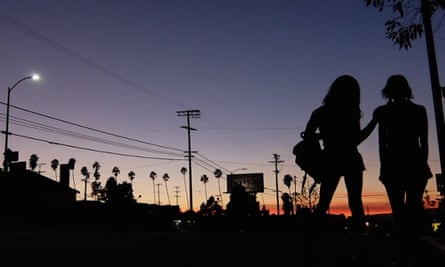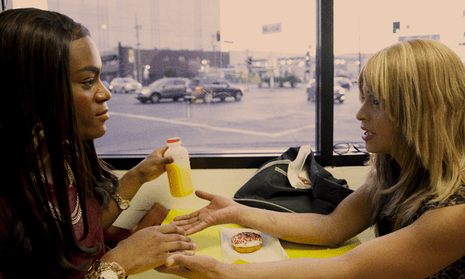Sean Baker’s micro-budget buddy comedy Tangerine caused a major stir at this year’s Sundance film festival following the reveal that the gorgeous-looking film was shot on iPhone 5s, something the film-maker had managed to keep a secret up until its world premiere. That surprising making-of factor has continued to bring the film attention leading up to its US theatrical release Friday, and is well worth celebrating for the hope it gives to other up-and-coming film-makers who want to make an impact with limited resources. But Tangerine is also vital for another, arguably more important, reason: it represents a major leap for transgender people on film.
Going into Sundance, the film was barely on anyone’s radar, save for fans of Baker’s previous acclaimed films, Starlet and Prince of Broadway. Buried in the event’s more formally experimental and adventurous Next section, Tangerine was sold by the festival with this official synopsis: “It’s Christmas Eve in Tinseltown and Sin-Dee is back on the block. Upon hearing that her pimp boyfriend hasn’t been faithful during the 28 days she was locked up, the working girl and her best friend, Alexandra, embark on a mission to get to the bottom of the scandalous rumor. Their rip-roaring odyssey leads them through various subcultures of Los Angeles, including an Armenian family dealing with their own repercussions of infidelity.”
All fine, except for the fact that Sundance failed to mention that both Sin-Dee and Alexandra are trans individuals, and that the main “subculture” the film explores is a trans street culture rarely seen on film.

The first official still for the film (see above) followed suit, by basking the two protagonists of Baker’s film in a dark shadow that completely masks their identities as trans people of color.
Unlike the cagey synopsis or photo would lead to believe, Tangerine is brash and brave in the way it presents its two fiery heroines as fiercely individualistic trans women trying to survive the streets of Los Angeles via any means necessary. It also features trans actors in the parts of its two principal trans characters – a sad anomaly in film.
Baker, a recent transplant to Los Angeles from New York, revealed during a retrospective of his work at the Film Society of Lincoln Center on Thursday night that Tangerine was inspired by him wanting to show Los Angeles’s “unofficial red light district” for the first proper time onscreen. “I knew there would be stories to be told there,” he said.
For eight months, Baker took to the streets with his team to get to know the area and its people. He eventually came across aspiring trans actor Mya Taylor, who plays Alexandra, the more reserved of the pair.
“She was our passport,” Baker said. Through Taylor, Baker met Kiki Rodriguez, a fellow trans actor who would be cast as the volatile yet lovable Sin-Dee. The second he saw them together, Baker knew he had a movie. It was a conversation that Rodriguez had overheard that led to the plot for Tangerine.
Baker said that Taylor and Rodriguez are both very close friends with the trans women who work the area. “They basically have witnessed a ton and wanted this story to be told,” he said. Before signing on, however, Rodriguez made one request of Baker. “She said: ‘I trust you, I want to make this movie with you, but you have to promise to show the harsh reality of what goes on out here. These women are here because they have to be, and I want you make it hilarious and entertaining for us and the women who are actually working the corner.’
“That was asking a lot,” Baker said. The filmmaker admitted that his approach would have been more downbeat and dramatic had Rodriguez not put her foot down. Looking back, he said he realized how right she was. “She was asking for something that would present these characters to mainstream audiences in a pop culture way, so that they could identify with them. That’s how we reach the mainstream.”

Comments (…)
Sign in or create your Guardian account to join the discussion